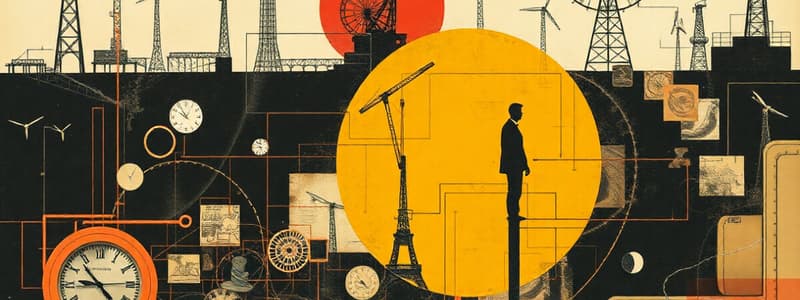Podcast
Questions and Answers
Which of the following best defines work in a physics context?
Which of the following best defines work in a physics context?
- The total energy consumed while performing an action.
- The effort applied without any movement.
- The product of force and displacement in the direction of the force. (correct)
- The process of doing something with energy.
What happens to the work done if the displacement is zero?
What happens to the work done if the displacement is zero?
- Work done is zero. (correct)
- Work done is maximized.
- Work done is halved.
- Work done increases indefinitely.
If a person lifts an object vertically at a constant speed, what can be said about the work done on the object?
If a person lifts an object vertically at a constant speed, what can be said about the work done on the object?
- No work is done regardless of the distance.
- The work done is positive. (correct)
- The work done is negative.
- The work done is only significant in energy consumption.
Which of the following scenarios would result in the least amount of work done?
Which of the following scenarios would result in the least amount of work done?
How is work related to energy in a mechanical system?
How is work related to energy in a mechanical system?
Study Notes
Definition of Work in Physics
- Work is defined as the product of force applied to an object and the displacement of that object in the direction of the force.
- Mathematically, work (W) is expressed as W = F × d × cos(θ), where F is force, d is displacement, and θ is the angle between the force and displacement direction.
Work and Displacement
- If the displacement is zero, no work is done, regardless of the applied force.
- Work requires movement in the direction of force; if there is no movement, the work remains zero.
Work Done in Vertical Motion
- When a person lifts an object vertically at constant speed, the work done on the object equals the gravitational potential energy gained.
- The constant speed implies forces are balanced, meaning the upward force equals the weight of the object.
Scenarios of Work Done
- Scenarios with minimal work done typically involve low force or displacement.
- Among various options, moving an object horizontally against negligible resistance results in the least work compared to lifting it vertically.
Relationship Between Work and Energy
- Work is a means of transferring energy within a mechanical system.
- The work done on an object can result in changes to its kinetic energy, potential energy, or both, depending on the context.
Studying That Suits You
Use AI to generate personalized quizzes and flashcards to suit your learning preferences.
Description
This quiz explores fundamental concepts of work in physics, including its definition, the impact of displacement on work done, and the relationship between work and energy in mechanical systems. Students will analyze scenarios to determine the amount of work done and understand the principles governing energy transfer.




